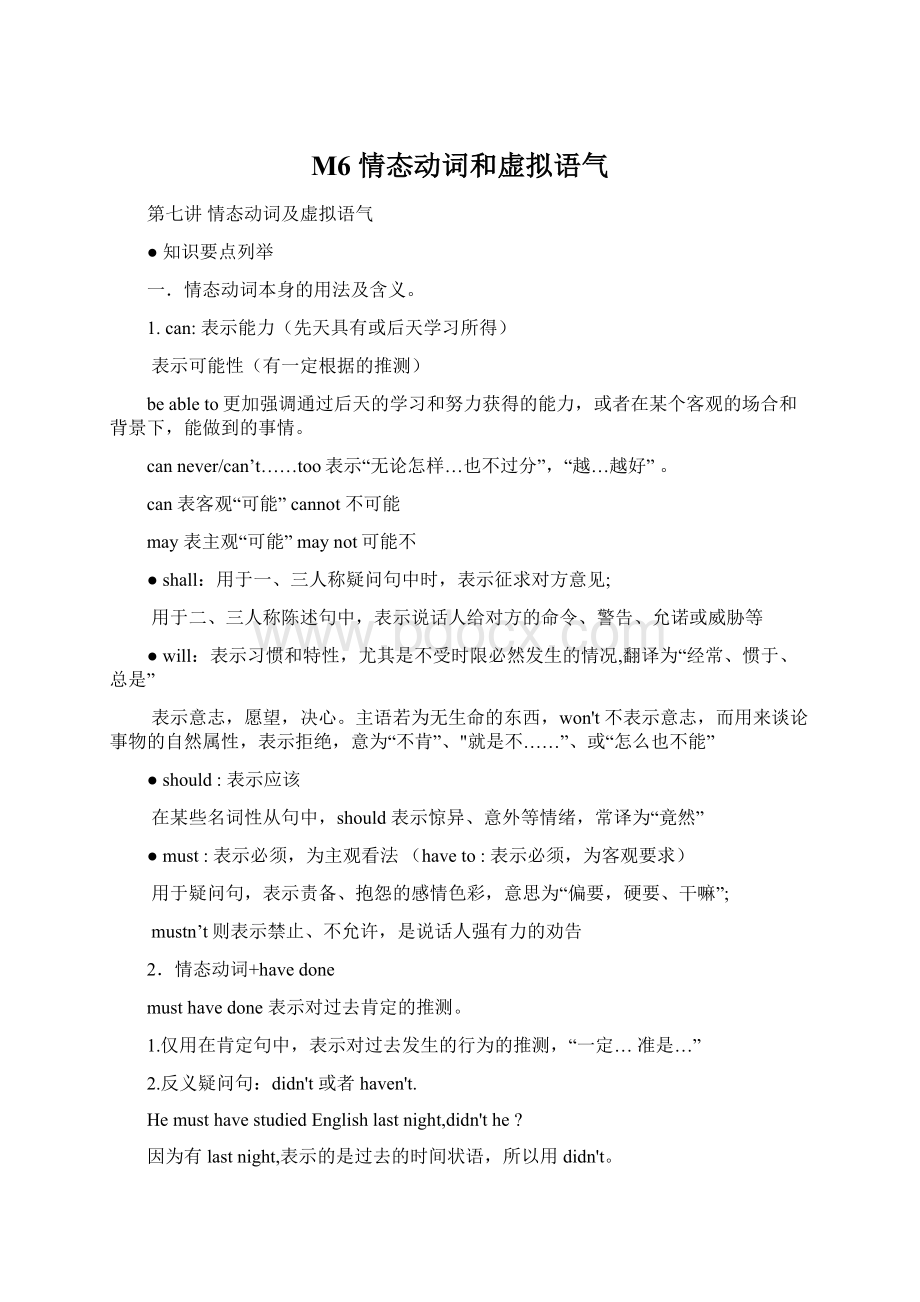M6 情态动词和虚拟语气文档格式.docx
《M6 情态动词和虚拟语气文档格式.docx》由会员分享,可在线阅读,更多相关《M6 情态动词和虚拟语气文档格式.docx(18页珍藏版)》请在冰豆网上搜索。

musthavedone表示对过去肯定的推测。
1.仅用在肯定句中,表示对过去发生的行为的推测,“一定…准是…”
2.反义疑问句:
didn'
t或者haven'
t.
HemusthavestudiedEnglishlastnight,didn'
the?
因为有lastnight,表示的是过去的时间状语,所以用didn'
t。
HemusthavestudiedEnglishforyears,hasn'
因为有foryears表示一段时间,持续至今,所以用现在完成时。
can/could+havedone表示对过去否定疑问的推测。
1.只能用在否定和疑问句中。
2.时间上都表示过去,语气上can比could更肯定
3.could+havedone常表示对过去可能做而没有做某事的遗憾,不高兴。
should/oughtto+havedone
1.肯定句中,表示过去应该做而实际上没有做的事。
2.否定句中,表示不该做而实际上做了。
3.oughtto比should口气更强烈
may/might+havedone对过去某事可能性的推测。
1.might比may的可能性更小
2.mighthavedone表示“本该……而没…”.表示委婉的责备、遗憾、愤怒。
3.如果主句动词是过去时,间接引语只能用
mighthavedone
4.may+havedone只能用于肯定或否定句中。
needn'
t+havedone表示做了没有必要的事。
只用在否定和疑问句中。
虚拟语气
一、虚拟语气用于条件句
说明
从句
主句
与现在事实相反
If+主语+动词的过去式(be动词过去式通常用were)
主语+would或should/could/might+动词原形
与过去事实相反
If+主语+动词的过去完成式(had+动词过去分词)
主语+would或should/could/might+have+过去分词
与将来事实相反
?
If+主语+should+动词原形
If+主语+wereto+动词原形
特别注意以下情况:
倒装结构
如果条件状语从句的谓语动词有were,had或should,可以把if省去,而把were,had或should移到主语前面,以倒装形式表示虚拟条件。
错综时间条件句
当条件从句表示的动作和主句表示的动作发生的时间不一致的时候(如一个发生在过去,一个发生在现在),动词的形式要根据它所表示的时间来调整。
含蓄条件句
有些介词短语如with/without...,butfor+名词或代词...butthat+从句(要不是……),inthatcase等,可以表示虚拟条件,连词but(但是),副词otherwise(否则),并列连词or(否则)也可以表示虚拟条件;
可以转换为一个if条件句。
二、虚拟语气用于其他从句
使用
情况
用法说明
在宾语从句中的使用
在suggest(建议),advise(建议),recommend(建议,劝告),propose(建议),demand(要求),request(请求),require(要求),order(命令),command(命令),insist(坚持),desire(欲望)等动词后的宾语从句中要求用“should+动词原形”或只用动词原形。
特别注意suggest和insist使用陈述句的情况
wish后的宾语从句表示不能实现的愿望。
Wish+主语+过去式(be
动词常与were)表示与现在事实相反
Wish+主语+haddone表示与过去事实相反
Wish+主语+woulddo表示与将来事实相反
在wouldrather,hadrather,的宾语从句中,表示“希望,宁愿”,表示现在或将来的情况,谓语动词用过去时;
表示过去的情况,谓语动词用过去完成时。
在itis(high或about)time+(that)的句型中,宾语从句中的谓语动词用过去时,有时也可以用“should+动词原形(should不能省略)”,意为“(早)该……”。
在主语从句中的使用
“Itis+过去分词(suggested,desired,requested,ordered,proposed,advised,demanded等)+that引导的主语从句”中that从句的谓语动词可用“should+动词原形”或省略should只用动词原形。
在主语从句中用以表示惊奇、惋惜、怀疑、不满、理应如此等时,也用虚拟语气“should+动词原形”,用于以下两种结构。
It'
snecessary/important/surprising/natural/strange/incredible(难以置信的)...that...(用于这种句型的形容词不是很多,同学们掌握这几个就够了。
)
sapity/ashame/nowonderthat..
在表语从句中和同位语从句中使用
当表示建议、要求、命令等的名词(如suggestion,advice,proposal,request,demand,requirement,order,idea等。
)做主语时,其后的表语从句和同位语从句也用虚拟语气,用“should+动词原形”或只用动词原形。
在asif/though(似乎、好像、仿佛),evenif/though(即使,就算)从句中的使用
同wish后的结构:
即
Asif+主语+过去式(be
动词常与were)表示与当时事实相反
Asif+主语+haddone表示与过去事实相反
Asif+主语+woulddo表示与将来事实相反
在sothat和inorderthat从句
主句(现在时)+sothat(+may;
can;
will;
beableto)
主句(过去时)+sothat(+could;
might;
would)
Incase
Lest
Forfearthat引导的状语从句
Forfearthat引导的状语从句中可用虚拟语气,结构为should+动词原形
Ifonly句型
在ifonly引起的表示愿望的感叹句中要用虚拟语气(和wish后宾语从句谓语动词的形式一样),意为“但愿”“要是……就好了”。
用于表示祝愿的句子中
Longlive+主语!
万岁
Mayyou+动词原形!
但愿
itis/wasthefirsttimesthat......动词形式用现在完成式或过去完成式
●例题精析
例题1:
——Ileftmyhandbagonthetrain,butluckilysomeonegaveittoarailwayofficial.
——Howunbelievabletogetitback!
Imean,someone______it.
A.willhavestolenB.mighthavestolenC.shouldhavestolenD.musthavestolen
思路分析:
句意为“——我把我的手提包落在火车上了。
但幸运的是,有人拾到交给了铁路部门。
——失而复得,简直难以置信!
我是说,本来可能有人会偷了去。
”willhavedone将来可以完成,musthavedone一定做过某事,表示对过去事情的肯定推测,都与题意不符。
shouldhavedone本来应该做某事,而实际没做,这就意味着希望有人偷包。
mighthavestolen过去可能做过,语气比较婉转或不肯定,根据句意选B。
参考答案:
B
例题2:
——Whatdoyouthinkofstoreshoppinginthefuture?
——Personally,Ithinkitwillexistalongwithhomeshoppingbut_____.
A.willneverreplaceB.wouldneverreplace
C.willneverbereplacedD.wouldneverbereplaced
句意为“——你对将来的商店购物怎么看?
——我个人认为会与在家购物并存,但商店购物不会被取代。
”根据Ithinkitwillexistalongwithhomeshopping,排除虚拟的选项D,这是表示将来的时间,考虑到被动语态。
C
例题3:
——How’syournewbabysitter?
——We________askforabetterone.Allourkidslovehersomuch.
A.shouldB.mightC.mustn‘tD.couldn’t
句意为“---你们的新保姆怎么样?
”“---找不到更好的了,我们的孩子都喜欢她”。
should应该,might可能,mustn‘t禁止,couldn’t不可能
D
例题4:
——Wherearethechildren?
Thedinner’sgoingtobecompletelyruined.
——Iwishtheyalwayslate.
A.weren’tB.hadn’tbeenC.wouldn’tbeD.wouldn’thavebeen
句意为“——孩子们哪儿去了?
这顿饭快要吃不起来了。
——我但愿他们不要老是迟到。
”wish引出虚拟语气,题干中出现always,从句虚拟使用一般过去时。
A
例题5:
We_____John’snameontheracelistyesterdaybutforhisrecentinjury.
A.willputB.willhaveputC.wouldputD.wouldhaveput
句意为“要不是因为他最近受伤,我们本应该把John的名字加进昨天的比赛名单中。
”butfor是虚拟语气的提示,yesterday表示过去的时间。
对过去的虚拟,用主语+should/would/could/might+havedone表达.
例题6:
—Ihaven’tgotthereferencebookyet,butI’llhaveatestonthesubjectnextmonth.
—Don’tworry.You______haveitbyFriday.
A.couldB.shallC.mustD.may
shall在第二人称中表示允诺,还可以表示强制,命令,威胁,警告。
还有在法律条文中的要求或规定。
例题7:
---theweatherhasveryhardanddry.
---Yes.Ifithadrainedadrop,thingswouldbemuchbetternow!
Andmyvegetables.
Awouldn'
tdieBdidn'
tdieChadn'
tdieDwouldn'
thavedied
第二个说话人的If条件句是我们选择正确【答案】的关键。
要是当时下雨了,现在的情况就好的多了!
我的蔬菜也就不会死了。
过去没有下雨,所以我的蔬菜干死了也是发生在过去。
而将句子还原则为Ifithadrainedevenadrop,myvegetableswouldn'
thavedied.
If+haddone,主句为couldn’t/shouldn'
t/wouldn'
thavedone.
●课堂巩固练习
1.--IwonderwhyMrGreenhasn’tshowedupatthemeetingyet.
---I’mnotsure,buthe_______inatrafficjamdrivinghere.
A.couldbestuckB.mightstuckC.mighthavebeenstuckD.musthavestuck
2.—Whydidn’tyoucometoMike’sbirthdaypartyyesterday?
—Well,I____,butIforgotit.
A.shouldB.mustC.shouldhaveD.musthave
3.Jane’spalefacesuggestedthatsheill,andherparentssuggestedthatshe------medicalexamination.
A.be;
shouldhav
eB.was;
haveC.shouldbe;
haveD.was;
has
4、Idon’tthinkhecouldhavedonesuchastupidthinglastnight,_____?
A.didheB.couldheC.doID.hasn’the
5、—ShallIgoandbuytwomorebottlesofbeer?
—No,I’vealreadyboughttwenty.That_____beenoughforustwo.
A.canB.mayC.oughttoD.might
6、—I’mthinkingoflosingweightthesedays.
—Oh,youbeoutofyourmind.You’re50kilogramsatthemost!
A.willB.shouldC.mayD.must
7、Heknowssomuchaboutthestory.Hemusthavereadthebook,?
A.mustn’theB.doesn’theC.hasn’theD.didn’the
8、Hedidnotregretsayingwhathedidbutfeltthathe
itdifferently.
A.couldexpress
B.wouldexpress
C.couldhaveexpressed
D.musthaveexpressed
9、—Guesswhat?
IhavegotAformytermpaper.?
—Great!
Youreadwidelyandputalotofworkintoit.?
A.mustB.should?
C.musthaveD.shouldhave
10.—Hehasn’tfinishedtheworkyet.
—Well,he_____.
A.oughtB.oughttoC.oughttohaveD.oughttohavefinished
答案:
1-5CCBAC6-10DCCCC
●能力提升
Inalandfaraway,onceuponatimetherewasgreatpoverty(贫困),andonlytherichcouldmanagewithoutgreat_26_.Threeofthoserichmenandtheirservantswere_27_togetheronaroadwhentheycametoavery_28_village.
Thefirstcouldnotstandseeingthepoverty,_29hetookallthegoldandjewelsfromhiswagons(四轮载重马车)andshared_30outamongthevillagers.Hewishedthemallthebestofluck,andheleft.
Thesecondrichman,seeingthe_31situation,stoppedforashorttimeandgave_32allhisfoodanddrink,sincehe_33seethatmoneywouldbeoflittle_34tothem.Hemadesurethattheyeach_35theirfairshareandwouldhaveenoughfoodto_36forsometime.Then,heleft.
Thethirdrichman,onseeingsuchpoverty,_37andwentstraightthroughthe_38withoutstopping.Thetwootherrichmensawthisfromadistanceandcommentedwitheachother_39thethirdrichmanlackedsympathy.Itwas_40thattheythemselveshadbeentheretoofferhelp.
However,threedayslater,they41thethirdrichman,whowascomingintheoppositedirection.Hewas42travellingquickly,buthiswagons,43thegoldandvaluablestheyhadbeen44,werenowfulloffarmingtoolsandbagsof45.Hewasrushingbacktohelpthemoutofpoverty.
26.A.lossB.ExpectationsC.successD.problems
27.A.standingB.travellingC.gatheringD.running
28.A.farawayB.poorC.differentD.ancient
29.A.unlessB.becauseC.soD.if
30.A.themB.anythingC.nothingD.those
31.A.curiousB.worryingC.dangerousD.puzzling
32.A.thevillagersB.hisservantsC.theothersD.therest
33.A.couldB.mightC.shouldD.must
34.A.interestB.concernC.useD.attraction
35.A.returnedB.gainedC.offeredD.received
36.A.remainB.lastC.supplyD.share
37.A.turnedbackB.setoutC.showedoffD.speeded
38.A.villageB.landC.fieldD.road
39.A.whetherB.howC.whereD.when
40.A.goodB.certainC.trueD.strange
41.A.welcomedB.metC.acceptedD.persuaded
42.A.stillB.alreadyC.alwaysD.indeed
43.A.exceptB.insteadofC.apartfromD.alongwith
44.A.loadingB.treasuringC.carryingD.earning
45.A.foodB.jewelsC.moneyD.seeds
.DBBCABAACDBDABABABCD
第八讲非谓语动词
非谓语动词在句子中的形式变化及作用
1.对于非谓语动词首先需要对其相应的变化形式有一个系统的了解,如表格所示:
动名词(以动词do为例)
形式
主动语态
被动语态
一般式
doing
beingdone
完成式
havingdone
havingbeendone
完成进行式
havingbeendoing
不定式